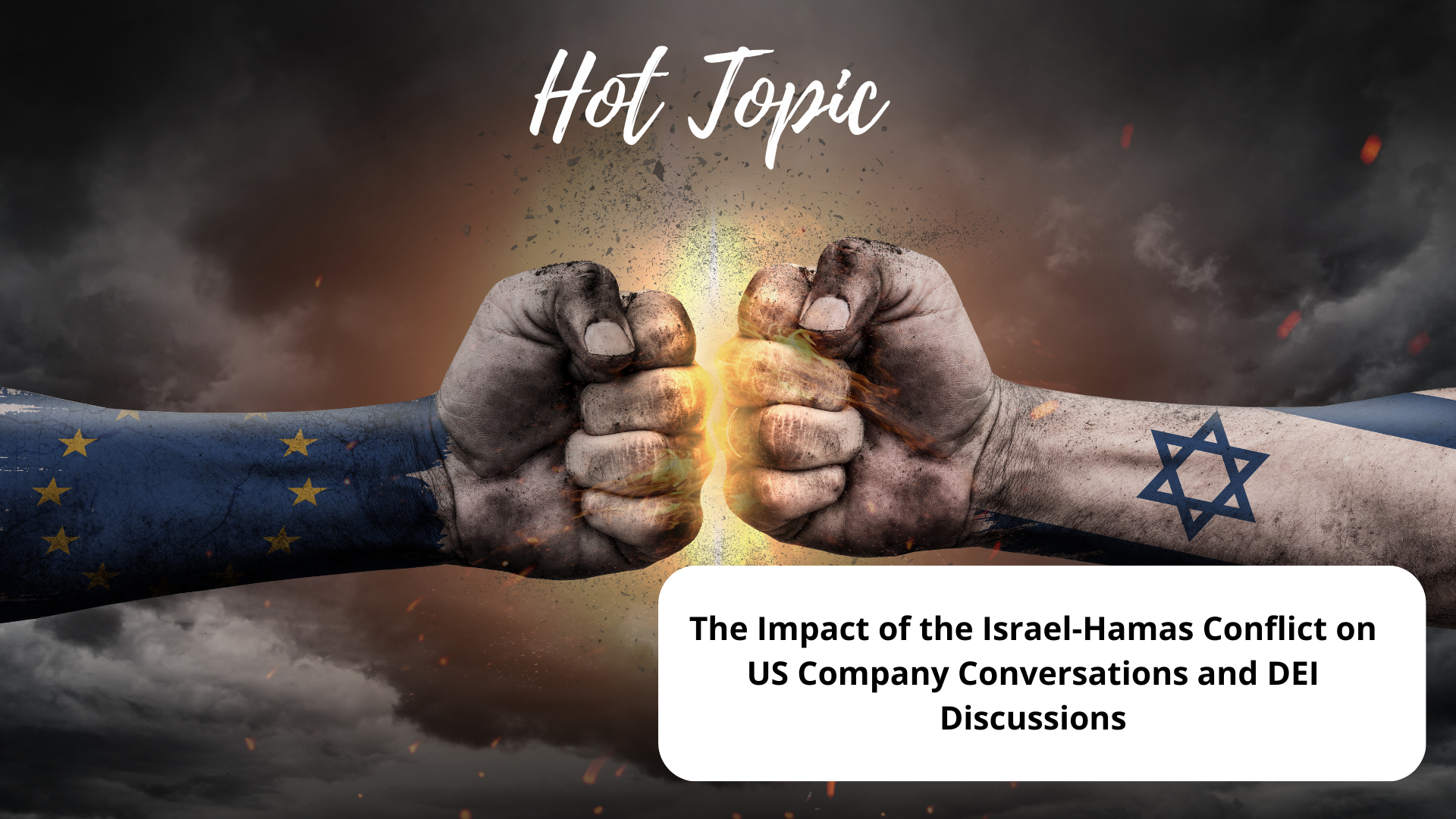The Israel-Hamas conflict has had ripple effects, extending beyond the Middle East and influencing conversations within US companies and DEI discussions. Understanding how this conflict shapes dialogues and initiatives within organizations is essential. As an individual who doesn’t have deep expertise in this area and with people I care about deeply on both sides, I recognize the turmoil this is causing in our organizations.
This blog post aims to provide insights into the impact of the Israel-Hamas conflict on US company conversations, DEI discussions, and employees, along with recommendations for fostering inclusive and constructive conversations when you don’t have deep knowledge of the issue.
Israel-Hamas Conflict: An Explanation
The Israel-Hamas conflict is a long-standing and complex conflict between Israel, a country in the Middle East, and Hamas, a Palestinian militant group. The conflict has its roots in the historical and political context of the region.
Historically, the land that is now Israel and the Palestinian territories was inhabited by a Jewish minority and an Arab majority. In the early 20th century, tensions grew as Jewish immigration to the region increased, driven by the Zionist movement’s goal of establishing a Jewish homeland. The British, who controlled the area under a League of Nations mandate, faced challenges in managing the competing interests of Jews and Arabs.
In 1947, the United Nations proposed a partition plan to divide the land into separate Jewish and Arab states. The plan was accepted by Jewish leaders but rejected by Arab leaders, leading to a war between Jewish and Arab forces after Israel declared independence in 1948. The war resulted in displacement and the creation of Palestinian refugee populations.
Over the years, conflicts and wars have erupted between Israel and its neighboring Arab countries, including Egypt, Jordan, and Syria. The Palestinian territories of the West Bank and Gaza Strip came under Israeli control during the 1967 Six-Day War. Israel’s occupation of these territories, along with the establishment of Israeli settlements, has been a major point of contention in the conflict.
Hamas, an Islamist political and military organization, emerged in the late 1980s with the goal of resisting Israeli occupation and establishing an independent Palestinian state. It has engaged in armed resistance, including rocket attacks and suicide bombings, against Israeli targets. Israel has responded with military operations and blockades to counter Hamas’ attacks and prevent the smuggling of weapons.
The conflict has been marked by cycles of violence, ceasefires, and attempts at peace negotiations. Efforts to find a lasting solution, including the establishment of a two-state solution with Israel and Palestine coexisting peacefully, have faced numerous challenges and have yet to be fully realized.
It is important to note that the historical context and narratives surrounding the conflict are complex and can vary depending on different perspectives. Understanding the historical background helps provide a foundation for comprehending the ongoing Israel-Hamas conflict.
How the Israel-Hamas Conflict Impacts US Companies
The Israel-Hamas conflict has raised several HR and diversity-related issues that are important for professionals in those fields to understand. The conflict has resulted in disruptions in international business operations and has led to employees requesting leave due to the impact of the violence. DEI and HR professionals have been tasked with responding to fears of workplace harassment and discrimination against various groups, including Jews, Muslims, Palestinians, and individuals of different ethnicities and nationalities.
In light of these challenges, HR departments have been urged to take appropriate action when instances of harassment or disparagement occur. It is recommended that front-line managers collaborate with HR to address such issues and ensure corrective action is taken. This may involve revisiting workplace anti-harassment policies to ensure they adequately address the current situation and clearly define protected and unprotected activities.
Employers have already taken disciplinary actions in response to the conflict. For example, law firms have rescinded job offers to individuals who made inflammatory comments about the Hamas attacks. Federal regulators, such as the U.S. Equal Employment Opportunity Commission, have also expressed their commitment to defending the rights of Jewish employees who experience antisemitism at work during this time.
Overall, the Israel-Hamas conflict has highlighted the importance of HR professionals and diversity practitioners in managing the impact of international crises on the workplace. It is crucial for organizations to navigate these challenges with civility, compassion, and empathy, while ensuring a safe and inclusive environment for all employees.
How the Israel-Hamas Conflict Impacts US Employees
The Israel-Hamas conflict has had a significant impact on various groups, including Jews, Muslims, Palestinians, and individuals of different ethnicities and nationalities. The conflict has created tensions and divisions among individuals of different ethnicities and nationalities. It has sparked debates and discussions that can sometimes lead to misunderstandings, stereotypes, and discrimination Here is just a few ways each group has been affected:
Israelis: Israelis in the U.S. often face difficult social dynamics due to the conflict. Discrimination and stereotyping can lead to social exclusion and the need to defend personal views. The stress of worrying about friends and family in conflict zones can significantly affect mental health. Community support is crucial for Israeli individuals to navigate these complex challenges, with an emphasis on fostering dialogue and understanding within the wider community
Jews: The conflict has led to a reported increase in antisemitic incidents globally, impacting Jewish individuals and communities with verbal and physical assaults, damage to property, and online harassment. These events have understandably led to heightened concerns for safety and the implementation of increased security measures, aiming to protect the well-being of Jewish communities.
Muslims: The rise in Islamophobia and discrimination as a result of the conflict has led to hate crimes against Muslims, including verbal and physical attacks, particularly targeting mosques. This has increased scrutiny and bias against Muslim individuals and communities, contributing to a climate of fear and insecurity. It is vital to promote inclusivity and safeguard the rights of Muslims to mitigate these effects.
Palestinians: Palestinians, not only in the Gaza Strip and the West Bank but also those living abroad, face repercussions from the conflict. While those in the immediate conflict zones confront direct violence and displacement, Palestinians in diaspora communities deal with the indirect effects such as discrimination, challenges in maintaining cultural ties, and distress over the situation back home. Efforts to support Palestinians must consider both the immediate needs of those in the conflict zones and the broader diaspora community.
People from diverse backgrounds may face challenges in navigating these discussions and may experience heightened emotions and sensitivities.
It is important to approach discussions and interactions with empathy, respect, and a commitment to understanding different perspectives. Promoting dialogue, fostering inclusivity, and condemning discrimination can help mitigate the negative impact of the conflict on these various groups.
Employee Expectations Regarding Conflict Discussions
The Israel-Hamas conflict has led to fervent discussions within U.S. companies, potentially causing workplace divisions. To manage these discussions constructively, companies are advised to:
- Recognize the Impact: It’s essential for companies to understand the tensions heightened by media portrayals and to empathize with the varying sentiments employees may harbor.
- State the Company’s Position: Transparency about the company’s views on the conflict, shared at the very minimal, internally, can guide the nature of internal dialogues.
- Foster Open Dialogue: Promoting varied channels for open communication, such as town hall meetings and anonymous feedback, is critical to cultivating empathy and mutual understanding among staff.
Inclusivity in Times of Conflict
With the Israel-Hamas conflict influencing Diversity, Equity, and Inclusion (DEI) discussions, organizations should consider:
- Allocating Resources for Challenging Discussions: DEI dialogues require dedicated support for one-on-one interactions, facilitating these exchanges with understanding and consideration.
- Consulting External Experts: Specialists in DEI and the conflict’s nuances can offer insights that ensure all voices are acknowledged and valued.
Guidance for Productive Dialogue
Organizations can implement these strategies to nurture constructive internal conversations:
- Implement Communication Protocols: Clearly defined communication protocols should underscore active listening, empathetic engagement, and the appreciation of varied viewpoints to foster an inclusive culture.
- Conflict Resolution Training: Providing staff with conflict resolution training can enhance their competence in managing challenging discussions, highlighting the importance of active listening, compassion, and seeking commonalities.
- Support Mental Health: Prioritizing psychological support helps staff address the emotional repercussions of conflict-related discussions.
As the Israel-Hamas conflict significantly influences workplace and DEI dialogues, it’s crucial for organizations to actively engage in several measures. Recognizing the conflict’s impact, fostering open communication, offering educational and supportive resources, stating the company’s stance, leveraging external expertise, establishing clear communication guidelines, providing conflict resolution training, and upholding mental health are all practices that can empower employees to participate in informed and respectful conversations about the conflict.







